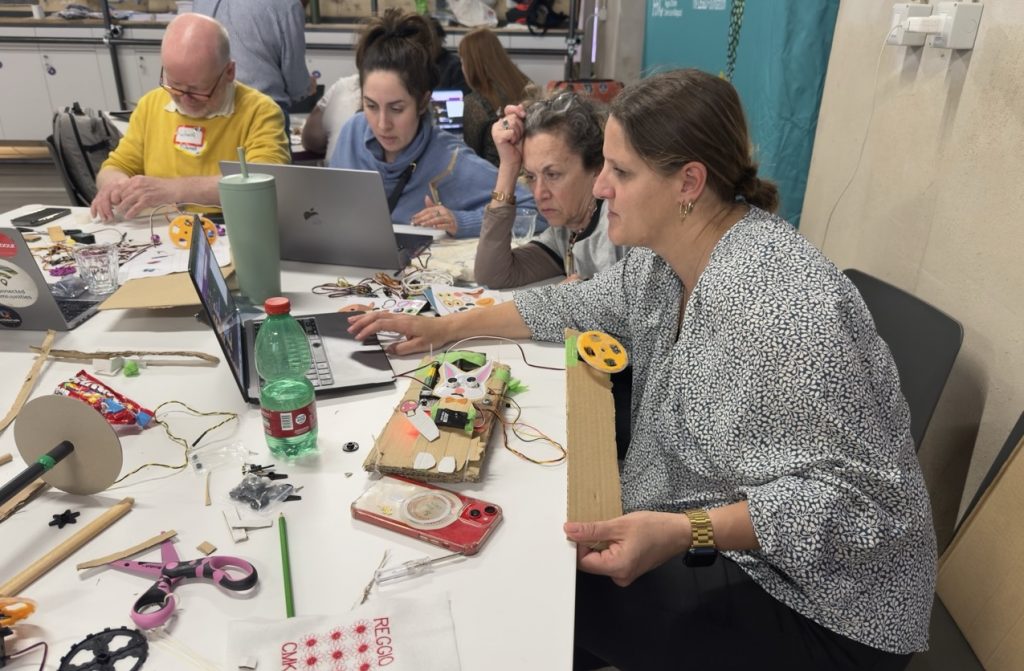
Event Info
You are invited to join creative educators from around the world for a unique five-day institute.
The Language of Computation
Constructing Modern Knowledge in Reggio Emilia
June 15 – 19, 2026
Reggio Emilia, Italy
This special Constructing Modern Knowledge institute will benefit from dialogue and collaboration with Reggio Emilia educators.
The theme of computation is a provocation for exploration of new intellectual domains combining the expertise of educators in Reggio Emilia and Constructing Modern Knowledge. Reggio Emilia is viewed as home to some of the world’s most inspirational, thoughtful, bold, and creative approaches to teaching and learning. Constructing Modern Knowledge is recognized for creating exciting learning adventures that transform the thinking and praxis of educators. Just as learning in Reggio Emilia is framed as a reciprocal process between children and adults, this institute offers opportunities to develop new educational terrain by bridging pedagogical cultures.
The Language of Computation is a nod to Loris Malaguzzi’s Hundred Languages of Children. We will explore the emergent and powerful idea of computation in the context of child development. The program of this institute will include talks by atelieristas, pedagogistas, and educators, hands-on exploration of ateliers at the Loris Malaguzzi International Centre, and computationally-rich projects led by Constructing Modern Knowledge. Fabulous meals, conversations, and celebrations of Italian culture round out the experience.

“If you can make things with computers, then you can make more interesting things, and you can learn a lot more by making them.”
– Seymour Papert
Objectives
The Language of Computation has the following objectives:
- Introduce educators of all subjects and grade levels to the profound ideas of the Reggio Emilia Approach® and the culture of Reggio Emilia
- Make the case for computation in the classroom
- Develop the computational fluency of participating educators through minds-on project-based experiences with constructive software environments
- Explore how computation can be part of a child’s intellectual laboratory and vehicle for self-expression
- Differentiate between digital and computational artifacts and experiences
- Consider computing as a form of play
- Think about thinking computationally
- Situate computation within progressive traditions
- Build a new community for teacher research around computation
The Need is Acute
- “Math” remains one of the most troublesome obstacles to schools realizing their potential to introduce children to things they don’t yet know they love. Teacher insecurity, curricular stagnation, and student antipathy towards the subject are especially unfortunate given the wondrous opportunities computation provides to reinvent mathematics for children. Ask even the most prominent progressive educators and they are likely to admit that math remains their school’s greatest challenge. No matter how learner-centered or empowering the rest of the institution happens to be, there is a part of the school day or week – math – during which coercion is reintroduced into the system. The failure to teach mathematics is a convivial and meaningful context reintroduces coercion into the system. That is ultimately corrosive to all other learner-centered practices. Seymour Papert teaches us that “The goal should not be to sugar coat the math they hate but offer them a math they can love.” This requires the invention of a new diet of mathematics for children. Computation represents a new world of human possibilities.
- Educators have much to learn from the incredible experience and wisdom of Reggio Emilian educators. This institute will place significant emphasis on what Reggio Emilia considers documentation and how that process informs learners, teachers, and the community by making invisible thinking visible.
- There are remarkably powerful, creative, and constructive computational software environments that bestow intellectual agency upon children and turn computers, software, and even artificial intelligence into active material for knowledge construction rather than passive instruments of indoctrination. Computers, computational materials like the micro:bit, and new programming environments add colors to a modern child’s crayon box.

“Computational thinking is going to be a defining feature of the future—and it’s an incredibly important thing to be teaching to kids today. There’s always lots of discussion (and concern) about how to teach traditional mathematical thinking to kids. But looking to the future, this pales in comparison to the importance of teaching computational thinking.
Yes, there’s a certain amount of traditional mathematical thinking that’s needed in everyday life, and in many careers. But computational thinking is going to be needed everywhere. And doing it well is going to be a key to success in almost all future careers. Doctors, lawyers, teachers, farmers, whatever. The future of all these professions will be full of computational thinking.
Whether it’s sensor-based medicine, computational contracts, education analytics or computational agriculture—success is going to rely on being able to do computational thinking well.
I’ve noticed an interesting trend. Pick any field X, from archeology to zoology. There either is now a “computational X” or there soon will be. And it’s widely viewed as the future of the field.”
